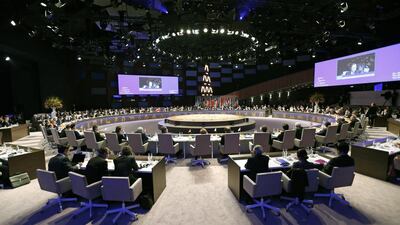THE HAGUE // Military material must be subject to independent inspections to strengthen global nuclear security, experts say.
But they warned that is a tough challenge as states are secretive and the political atmosphere between the big powers and Russia would be crucial.
After convening for two days in Amsterdam at the Nuclear Security Summit’s fringe event, they also called for the establishment of a global alert system in the event of a cyber attack on nuclear facilities.
“Military materials need to be taken up,” said Miles Pomper, a senior research associate at the Monterey Institute of International Studies in Washington. “Most of it was focused on civil but, hopefully, going into 2016, we will focus more on military.”
He was speaking in The Hague on Tuesday, during a talk about the Nuclear Knowledge Summit.
The discussion on the exchange of information between countries, such as the United States, UK and France, and how to provide standards on military material is in the early stages.
“We need to get other nuclear weapon states like China, Russia and Pakistan to join,” he said. “But it’s certainly a step in the right direction.”
Most nuclear material is in the hands of the military.
“Why should we protect only a small portion of it when we can protect all of it?” Mr Pomper asked.
John Bernhard, a former Danish ambassador to the International Atomic Energy Agency (IAEA), said the move would strengthen the nuclear-security process.
“The large majority of highly enriched uranium is in the military field, used in the fleet, in ships for instance,” he said.
“The civilian use is still only a smaller part of the total material, which is dangerous.”
He said the initiative would pose great difficulty.
“This is because states are much more secretive,” said Mr Bernhard.
“There is in The [Hague] communique a couple of lines that state that materials in the military field have to be guarded well and live up to nuclear security. But there isn’t sensitive information and inspections from outside. That’s the difficult part.”
He said he was not hopeful it would change in the near future.
“But it also has to do with the general political atmosphere with Russia and the other big powers,” he added.
Still, the knowledge summit managed to touch on many valuable points.
Anita Nilsson, the former director of the office of nuclear security in the department of nuclear safety and security at the IAEA, said the summit was crucial in discussing how nuclear energy was playing a role in our society.
“Part of the summit was to help understand how the more theoretical parts fit with the reality, namely how nuclear energy is playing a role today in our lives,” she said.
“How this influences opportunities to produce the necessary medical isotopes for radiation treatment and for diagnostic purposes, now and in the future.”
Paul Wilke, a senior research fellow at The Netherlands Institute of International Relations, said the industry had to work closer with NGOs and experts to find solutions to the nuclear problems as they may have some influence on governments.
“Governments sometimes can’t move fast enough on these issues,” Mr Wilke said. “So we need to find a way to accomplish that.”
He said the issue of cybersecurity was also crucial.
“Right now, there is no real coordination in that field.
“Perhaps it would be good to have a focus point where the nuclear industry could be notified so that immediately, all the industry in the same field would know that there is an attack, its nature and how to deal with it. It’s a common, shared threat.”
The Nuclear Knowledge Summit was held in Amsterdam on Friday and Saturday, while the Nuclear Security Summit in The Hague ended on Tuesday.
cmalek@thenational.ae

